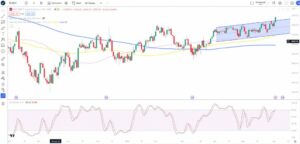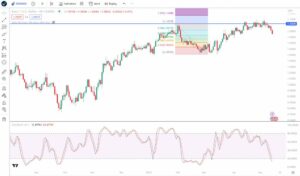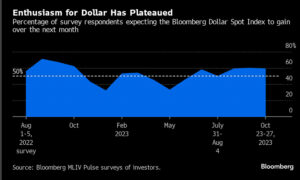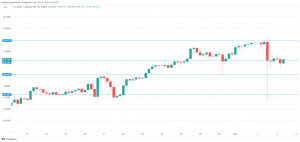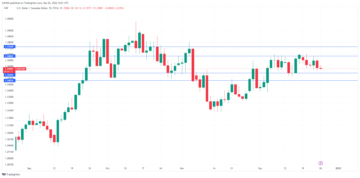Global equities were in freefall as investors fled to safe-haven assets after Russian missiles and airstrikes hit dozens of Ukraine cities. Regional warfare will intensify inflationary pressures globally as energy markets could still see another massive surge after the EU/US respond. Some investors are panic selling as there are too many questions about inflation and growth.
Stagflation risks will complicate what central banks do going forward and right now investors are selling stocks and piling into commodities. The Nasdaq tentatively fell into bear market and that attracted many buyers. Dip buyers are looking at falling real yields and companies that still have reasonable growth and valuation outlooks.
Financial conditions are tightening, and the Fed will not want to shock markets. As the escalation Russia-Ukraine conflict intensifies expectations for Fed rate hikes will vary as some traders anticipate inflationary shock to trigger aggressive tightening, while others focus on the downside risks to the economy.
Many long-term investors that have been holding onto cash for a long time cannot pass up buying the Dow Jones Industrial Average at a 10% discount and with the Nasdaq 20% lower than it was just a few months ago. The developments in the Ukraine are tragic but for now it does not seem like this will be a catalyst that sends the US economy into a recession over the next year or two. Hard-hitting sanctions would not only punish Russia but also Europe, so the afternoon rebound embraced the not-so-hard second round of sanctions.
FX
The Russian ruble is weakening dramatically following the Russian attack on Ukraine. The Russian central bank tried to support the ruble and prevent a collapse of Russia’s financial system, but clearly was not successful. Currency interventions oftentimes fuel excessive moves against what a central bank is trying to achieve and that is exactly what happened to Russia.
Oil
Crude prices gave up most of their gains after the Biden administration announced they will once again tap strategic reserves when they need to and after the second round of sanctions did not put Russian energy supplies at risk. Energy traders were a bit over-aggressive in expecting prices to accelerate beyond the century mark and will likely see a whipsawish market for quite some time.
The oil market remains tight and potential for an extended military conflict is growing and that should keep oil prices above the $100 level over the short-term. What is complicating the bullish outlook for crude is how much of a release from strategic reserves energy markets will see and what will happen with the Iran nuclear deal talks.
Gold
Gold prices quickly tumbled after it became clear it would not have a catalyst to take out the $2000 level today. Gold’s afternoon selloff accelerated after President Biden unveiled the next round of sanctions, which many thought were not hard-hitting enough given last night’s Russian invasion of Ukraine. The decision not to kick Russia out of the Swift banking system means both Russia and Europe won’t suffer immediate additional economic pain.
Russia’s invasion of Ukraine is a gamechanger and demand for safe-havens will remain elevated and gold prices will likely see strong support over the short-term.
Bitcoin
Bitcoin continues to act like the ultimate risky asset, tumbling hard after Russia launched an attack against Ukraine. If Bitcoin can hold onto the $30,000 level over the short-term, that would likely mean investors are still upbeat about the economic outlook and that risky assets should stabilize once the Russian/Ukraine crisis impact is better understood. If Wall Street becomes fearful that a recession will happen over the next 24 months, that could be the trigger for many institutional investors to abandon the crypto ship.
- Coinsmart. Europe’s Best Bitcoin and Crypto Exchange.
- Platoblockchain. Web3 Metaverse Intelligence. Knowledge Amplified. FREE ACCESS.
- CryptoHawk. Altcoin Radar. Free Trial.
- Source: https://www.marketpulse.com/20220224/us-close-russia-attack-ukraine-changes-everything-inflation-growth-outlooks-stocks-rebound-ruble-pummeled-oil-volatile-gold-turns-negative-bitcoin-stabilizes/
- 000
- About
- accelerate
- Act
- Additional
- announced
- Another
- asset
- Assets
- average
- Bank
- Banking
- Banks
- Bear Market
- biden
- Bit
- Bitcoin
- Bullish
- Buying
- Cash
- Central Bank
- Central Banks
- Cities
- Commodities
- Companies
- conflict
- continues
- could
- crisis
- crypto
- Currency
- deal
- Demand
- developments
- DID
- Discount
- dow
- Dow Jones
- Dow Jones Industrial Average
- dramatically
- Economic
- economy
- energy
- Europe
- everything
- expectations
- Fed
- financial
- Focus
- following
- Forward
- Fuel
- Globally
- going
- Gold
- Growing
- Growth
- hold
- How
- HTTPS
- Impact
- industrial
- inflation
- Institutional
- institutional investors
- Investors
- Iran
- IT
- Level
- Long
- looking
- mark
- Market
- Markets
- Military
- months
- most
- Nasdaq
- Oil
- Outlook
- Pain
- Panic
- president
- quickly
- reasonable
- recession
- Risk
- Risky
- round
- Russia
- Sanctions
- So
- Stocks
- Strategic
- street
- strong
- successful
- support
- surge
- SWIFT
- system
- Talks
- Tap
- time
- today
- Traders
- Ukraine
- us
- US economy
- Valuation
- Wall Street
- What
- What is
- year






